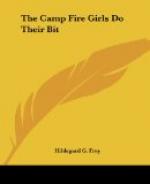He had known her years before he had the fever. Somewhere in his dreamy, imaginative boyhood he had read the Song of Hiawatha, and his glowing fancy had immediately fastened upon the lines which described the Indian girl, Minnehaha, Laughing Water, daughter of the old arrow-maker in the land of the Dacotahs:
“With him dwelt his dark-eyed daughter,
Wayward as the Minnehaha,
With her moods of shade and sunshine,
Eyes that smiled and frowned alternate,
Feet as rapid as the river,
Tresses flowing like the water,
And as musical a laughter;
And he named her from the river,
From the waterfall he named her,
Minnehaha, Laughing Water.”
The image thus conjured up remained in his mind, a tantalizing vision, until at last he found himself filled with a desire to find a maiden like the storied daughter of the ancient arrow-maker in the land of the Dacotahs, dark-eyed, slender as an arrow, sparkling like the sunlight on the water, with laughter like the music of the Falls. Sometimes he saw her in his dreams, and through the long weeks in the hospital at the aviation camp when he had the fever she was with him constantly, beckoning, calling, luring him back to life when he was about to slip over the edge into the bottomless abyss, her laughter ringing in his ears after she had vanished into the mists. Then one night she and the fever had fled hand in hand and after that he could not recall her image, though her memory still tantalized him.
Not until today, when the soothing motion of the long Pullman car and the lullaby droning of the wheels had lulled him to sleep with his elbow on the windowsill and his head resting on his thin, transparent hand, did she come back to him in a dream. In that daytime nap he had suddenly heard her laughter ring out and with flying footsteps followed the sound, hoping to come upon her at every turn, but just when he was about to overtake her the train stopped with a jerk and startled him back into consciousness, with the echo of her laughter still ringing in his ears.
And now, when his pursuit had been vain and her luring laughter had died away in his ears, she came back and stood in the shadowy end of the aisle, watching him with large, luminous eyes, just as she used to come and watch him wrestle with the fever. Breathless, he looked at her, waiting for her to vanish, but she did not. Then it came to him that he might go to her, might reach her this time before she fled. But something lay on his shoulder, something that weighed him down and kept him from moving, kept him from rising and going to her. He tried to shake it off, but it remained. He tried again, keeping his eyes on her all the time. Then the long vista of green plush seats leading to her was blotted out and he found himself gazing into a dusky countenance, while an unctuous voice murmured in his ear:
“How you feelin’, Looten’t? Gettin’ light-headed, wasn’t you? Here’s the milk you ordered for two o’clock. Just drink it now, Looten’t, and you’ll feel all right.”




